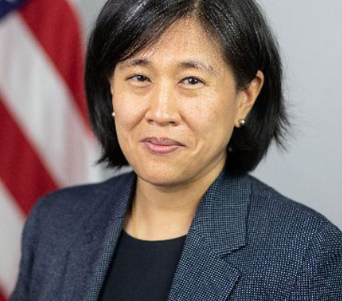America
US considers reducing tariffs, other tools to fight runaway inflation: Trade Representative

Washington [US], May 3 (ANI/Sputnik)
The Biden administration is considering lowering the existing trade tariffs amid all other available tools to fight the galloping inflation in the United States, US Trade Representative Katherine Tai said during an event organized by the Milken Institute.
"We need to be looking at our economic policy tools across the board. You want to look at tariffs? Sure, let's look at tariffs, but also let's look at monetary policy, fiscal policy. Let's look at tax policy. All of these tools you need to look at," Tai said on Monday when asked whether reducing tariffs can be a solution to taming inflation. "All tools are on the table." Tai pointed out that rising prices in the United States are a "shocking challenge" and whatever tools are deployed to solve it must take into account medium-term goals and not short-term ones.
The United States is experiencing the highest rate of inflation in over four decades. The latest Personal Consumption Expenditure (PCE) Index, a US inflation indicator closely followed by the Federal Reserve, grew 6.6 per cent in the year to March, keeping to its fastest expansion in four decades with energy increasing by nearly 35 per cent and food by 10 per cent.
Tai's office is required to begin notifying companies by this weekend of the impending termination of Trump-era Section 301 tariffs that were imposed on an initial USD 34 billion in Chinese goods in 2018, according to Politico citing a 1974 statute.
Last week, the White House said it is continuing to look at the tariffs on China introduced by the Trump administration. The Biden administration is looking at how the tariffs impact jobs, wages, and inflation, Press Secretary Jen Psaki told reporters.
In 2018, the US hiked duties on certain Chinese imports in a bid to balance the trade deficit. Both countries exchanged several rounds of reciprocal tariffs the following year.
In January 2020, the Trump administration and the Chinese government made a two-year trade deal known as "Phase One," under which the US retained 25 per cent duties on Chinese goods worth about USD 250 billion per year, and 7.5 per cent duties on goods worth USD 120 billion, while China committed to purchasing USD 75 billion worth of US industrial goods, USD 50 billion worth of energy, USD 40 billion worth of agricultural products and up to USD 40 billion in services.
In December 2021, China said it made efforts to fulfil the deal despite the pandemic and expressed the hope that the US would also make efforts on its end to continue developing bilateral trade.

2 hours ago
Aware of Delhi explosion, closely monitoring the situation: US State Department

4 hours ago
Red Fort blast: Death toll reaches 10; security tightens at RSS HQs in Nagpur

5 hours ago
Red Fort blast: Leaders express condolences to the affected families

5 hours ago
Delhi: 8 killed, dozen injured in car explosion near Red Fort; high alert in Maha, UP

5 hours ago
With US sanctions waiver, India to continue operations at Chabahar port, facilitating trade for countries like Afghanistan

6 hours ago
GOPIO International Engages with Former Minister Smt. Meenakshi Lekhi

6 hours ago
AAPI, American Academy of Yoga and Medicine, and India’s Ministry of AYUSH to Host Groundbreaking Conference on Integrative Health in Memphis, TN

6 hours ago
US Senate votes to end shutdown, paving way for government reopening

6 hours ago
US lawmakers move to halt China's toxic vape invasion threatening American youth

7 hours ago
Gov. Greg Abbott Announces Fourth-Term Bid at Houston Event

10 hours ago
"People that are against tariffs are fools": Trump says at least $2,000 dividend a person coming for Americans

10 hours ago
Explosive claims rock Dhaka; Ex-Minister points finger at US Aid giant, Clintons in Hasina's downfall

10 hours ago
"What a terrible thing for Democracy!": Trump decries BBC executives over reports of doctoring speech






















